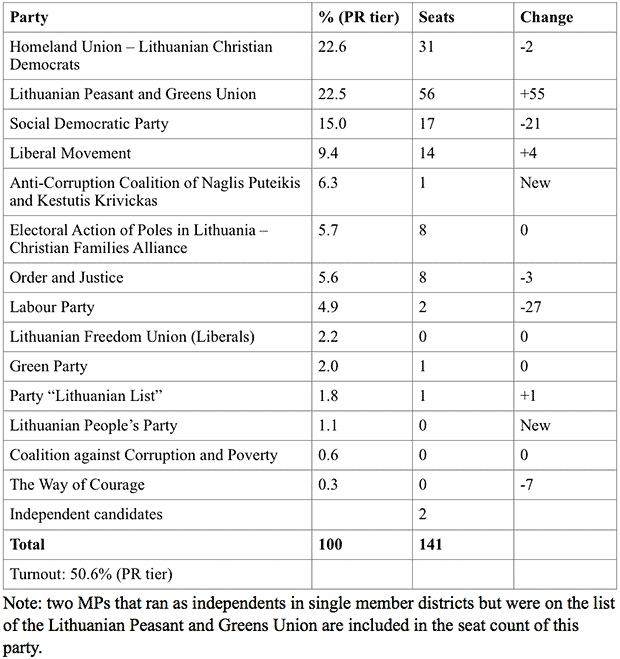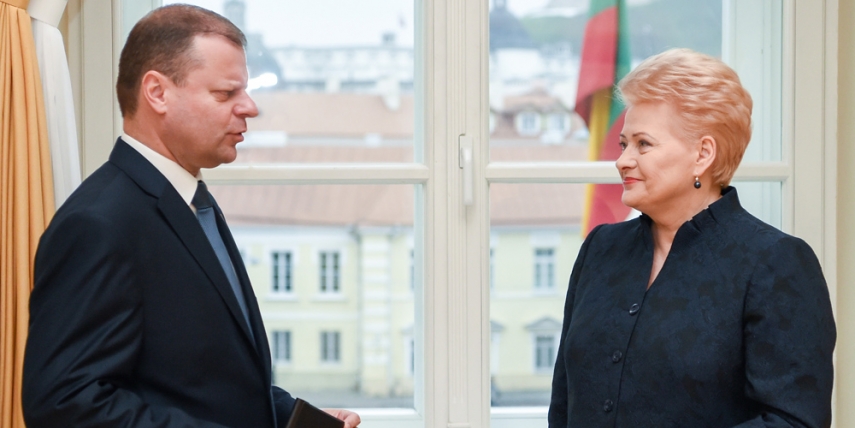By Raimondas Ibenskas (University of Southampton)
On the 13th of December, Lithuanian parliament Seimas approved the programme of the new government formed by the coalition between the Union of Peasants and Greens and the Social Democratic Party. The parliamentary vote completed the government formation process that started after the second round of the Seimas election on the 23rd of October. The election resulted in a surprise victory of the Peasants and Greens, which scored 56 seats (40% of the total) after having received only one seat in the previous election in 2012.

The new government reflects the change in the balance of parliamentary power after the election. The Peasants and Greens nominated 12 members of the government including Prime Minister Saulius Skvernelis while only 3 ministers represent the minor coalition partner Social Democrats, a substantial climbdown for the largest parliamentary and governmental party in the previous parliamentary term. In addition to being able to rely on the support of 78 MPs in the factions of the two government parties, the programme of the government was also supported by the legislators representing the Polish ethnic party The Electoral Action of Poles in Lithuania – Christian Families Alliance as well as several MPs in the party “Order and Justice”.
The key feature of the new government is that a majority of its members are formally independent politicians. One of the key pledges of the Peasants and Greens in the election campaign was to appoint the “government of experts” formed primarily on the basis of competence as opposed to party affiliation. The party more than delivered on this promise: only one of its ministers, Minister of Agriculture Bronius Markauskas, is a member of the party. Most importantly, Prime Minister Saulius Skvernelis himself is a popular independent who served as Minister of Interior in the government led by the Social Democrats in 2014-2016 as a representative of “Order and Justice”. Having disassociated himself from the latter, and after a brief flirt with several other parties, Skvernelis declared in March 2016 that he would be running in the parliamentary election with the Peasants and Greens. Although he did not formally join the party, he was its most visible representative during the election campaign, more so than the leader of the Peasants and Greens Ramūnas Karbauskis. The Social Democrats also nominated one independent minister (Minister of Justice Milda Vainiutė) after three other nominees had to withdraw their candidatures due to the involvement in scandals and/or the vetoes from the Peasants and Greens.
The dominance of independent politicians in the government, some of them without any previous experience of working with the Peasants and Greens, raises important questions about whether it will be able to assure stable support in Seimas. The relationship between Skvernelis and the leader of the party and its parliamentary group Karbauskis will therefore be crucial for the stability of government. The positions of the two leaders diverged somewhat in the negotiations on coalition formation, and immediately after the election Karbauskis raised the idea of the Peasant and Green MEP Bronius Ropė becoming Prime Minister instead of Skvernelis. Also, according to the manobalsas.lt candidate survey conducted before the election, Skvernelis’ positions on social issues are more liberal than those of Karbauskis. The potential for government instability is further increased by the diversity of Peasant and Green MPs on economic and social issues and the fact that many of them are also independents who may not be easy to discipline even with Karbauskis serving as the chairperson of the party’s parliamentary group.
Nevertheless, the Peasants and Greens also have several important cards to play that may allow them to see through their term in government successfully and consolidate their position as one of the key political parties in the Lithuanian political system in the longer term. They seem to have managed to establish a working relationship with President Dalia Grybauskaitė, a persistent critic of the governments led by Algirdas Butkevičius of the Social Democrats in 2012-2016. Despite her quite clear sympathies to the Homeland Union – Lithuanian Christian Democrats, Grybauskaitė was appeased, at last temporarily, by being able to play a key role in several appointments including those of Ministers of Foreign Affairs and Defence. Provided that they stay relatively united, the Peasants and Greens might also be able to push forward their centre-left economic and socially conservative agenda by allying with the Social Democrats on the former and with the Homeland Union on the latter issues.
The unrest inside other parties could further benefit the Peasants and Greens. Both the Social Democrats and the Homeland Union face divisive leadership contests in the first half of 2017. In the former, Butkevičius is widely blamed not only for pushing for the widely unpopular neo-liberal welfare reform that contributed to the party’s electoral defeat, but also for mishandling the coalition negotiations after the election, especially for giving up the Ministry of Social Security and Labour that could have allowed the party to renew its image as a social democratic force. However, with Butkevičius’ departure almost certain, the party may struggle to find a suitable replacement and indeed a response to the competition from the Peasants and Greens on the centre-left of the political spectrum. While the position of the leader of the Homeland Union Gabrielius Landsbergis is substantially stronger, as a representative of the liberal conservative faction of the party he also faces a strong challenge from the Christian Democratic wing that strongly preferred entering into a government coalition with the Peasants and Greens. Finally, the Liberal Movement, the party with probably the most different programmatic positions from those of the Peasants and Greens, is still recovering after a major corruption scandal earlier in 2016, thus limiting its effectiveness as an opposition to the main party in government.
Photo source: http://www.baltictimes.com/lithuanian_president_proposes_skvernelis_for_pm/


